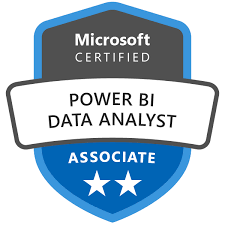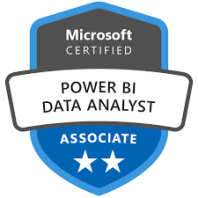
Get certified with the PL-300 Exam – Microsoft Power BI Data Analyst Associate certification.
Learn how to prepare, model, visualize, and analyze data to deliver actionable insights using Power BI—Microsoft’s powerful business intelligence platform.
You’re correct that the PL-300 Exam is associated with analyzing data, building data models, and creating compelling visual reports with Power BI. This certification is officially titled Microsoft Certified: Power BI Data Analyst Associate and is designed for professionals looking to validate their ability to make data-driven decisions with Power BI.
📘 Exam Overview: PL-300
-
Full Title: Microsoft Power BI Data Analyst
-
Certification Earned: Microsoft Certified: Power BI Data Analyst Associate
Ideal Candidates:
-
Data Analysts
-
Business Intelligence (BI) Professionals
-
Data-Driven Decision Makers
-
Power BI Users
-
Professionals who work with data from various sources to produce reports and dashboards
🧠 Skills Measured
The PL-300 exam assesses your ability to:
Prepare Data
-
Identify and connect to data sources
-
Clean, transform, and load data
Model Data
-
Design and create data models
-
Perform DAX calculations
-
Optimize model performance
Visualize and Analyze Data
-
Create reports and dashboards
-
Use Power BI visuals effectively
-
Perform advanced analytics and AI features
Deploy and Maintain Assets
-
Manage datasets and workspaces
-
Set up and configure Power BI service
-
Implement row-level security
📝 Exam Details
-
Exam Code: PL-300
-
Format: Multiple-choice questions, case studies, and performance-based tasks
-
Duration: Approximately 120 minutes
-
Passing Score: 700 out of 1000
🎯 Career Benefits
Achieving the PL-300 certification can:
-
Validate Your Expertise: Show your ability to turn raw data into meaningful insights with Power BI
-
Enhance Career Opportunities: Qualify for roles such as Data Analyst, BI Analyst, Reporting Analyst, and more
-
Increase Earning Potential: Certified professionals often attract better job offers and salary packages
-
Stay Relevant: Keep up with industry trends and advancements in business analytics and Power BI capabilities



